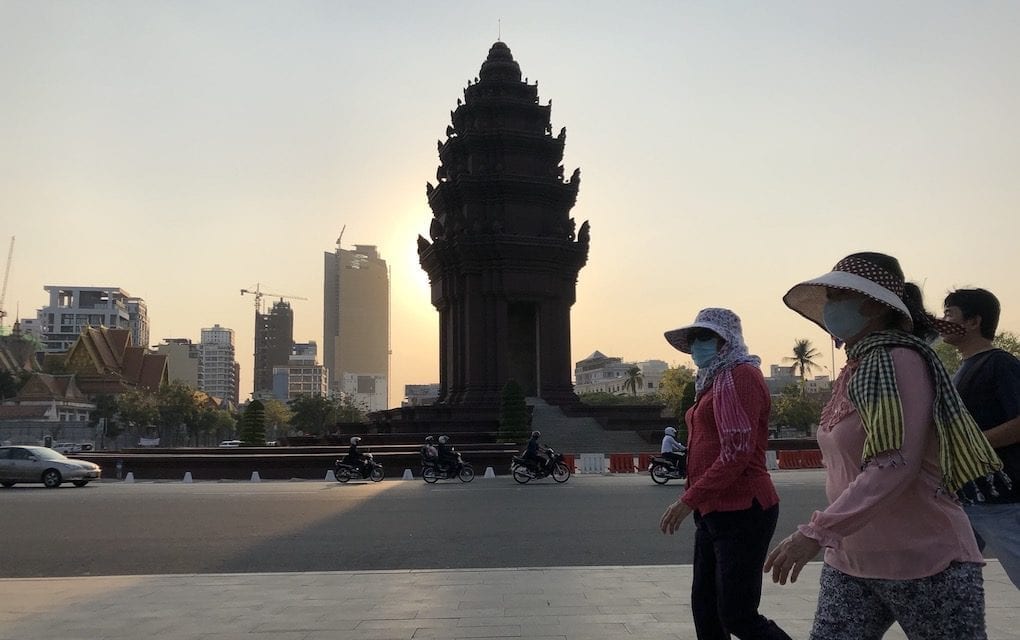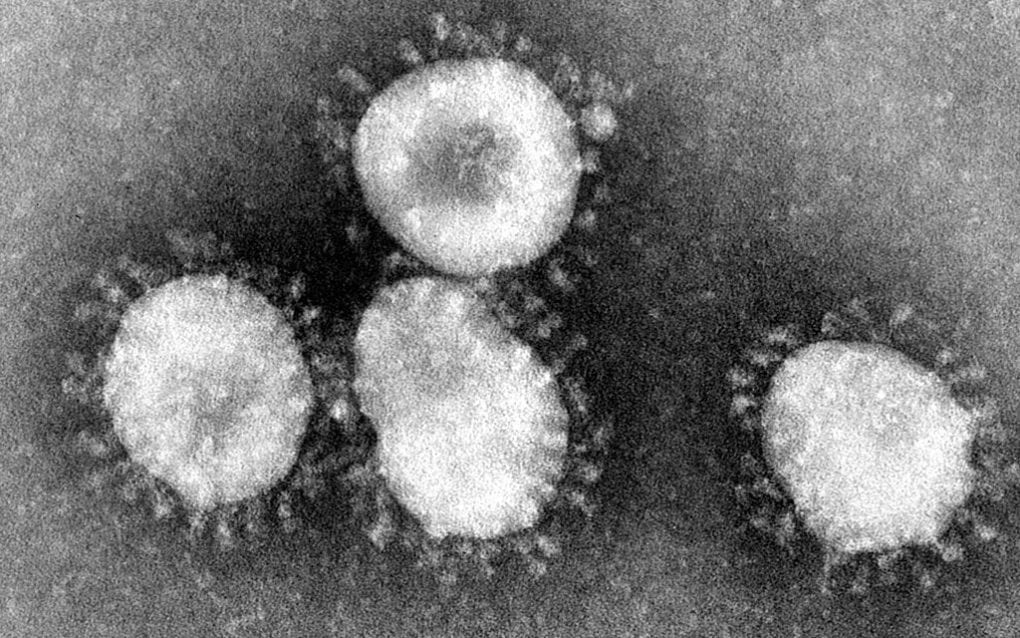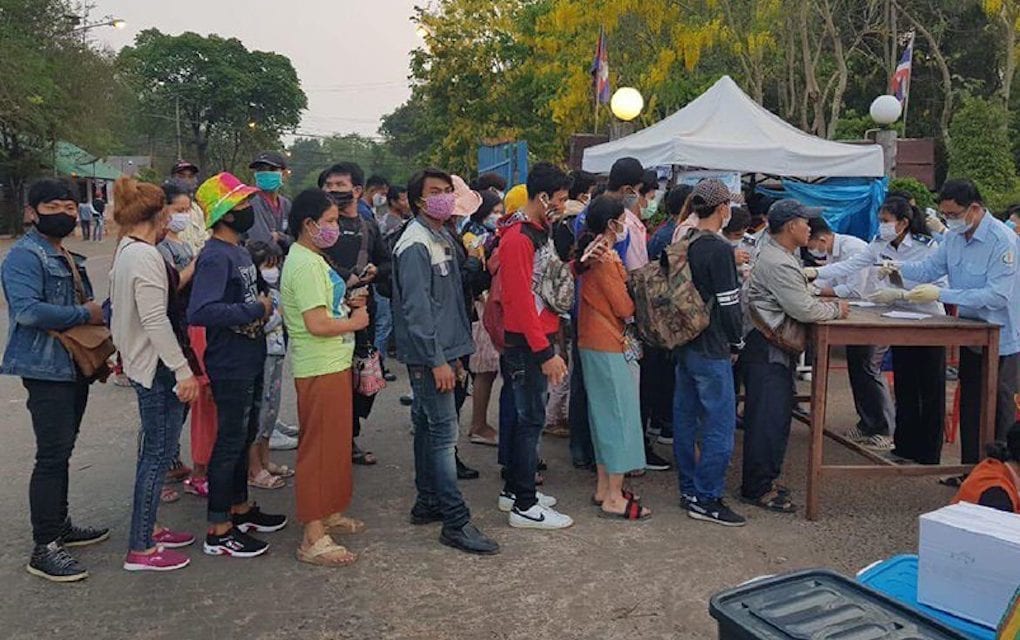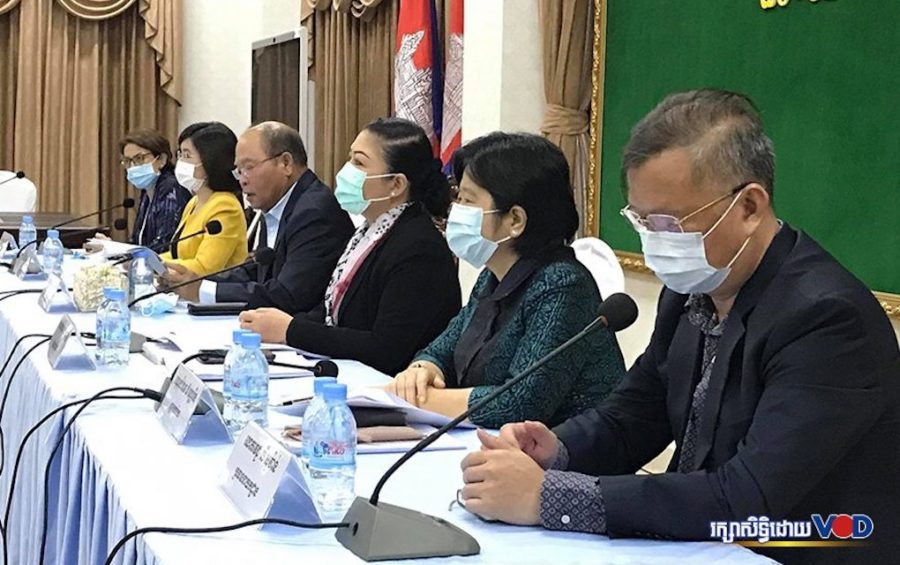After more than a week of no new Covid-19 cases reported in the country, the World Health Organization’s representative said the Health Ministry had been advised to increase testing and contact tracing while Cambodia was still in an early stage of the global pandemic.
The statement came as latest test figures from the ministry show that less than a quarter of the number of samples that could be tested each day, at the current national capacity, were processed on average last week.
“We advise [the] Ministry of Health to expand, a little bit more aggressive contact tracing and testing more,” Li Ailan, WHO’s country representative, said on Monday during a press conference in Phnom Penh.
“We advise [the] Ministry of Health to start active case finding. Go, reach out to find it,” she said.
On Tuesday morning, the Health Ministry again reported no new cases, marking the ninth consecutive day without a fresh infection.
The ministry last reported new positive cases of the respiratory disease on April 12: a man and a woman who tested positive the day before and were quarantined in the capital’s Chak Angre Krom Health Center. The 50-year-old man has already tested negative for the virus twice and was allowed to be discharged, the ministry said on Tuesday.

A Covid-19 surveillance report from the ministry dated Sunday says the couple contracted the virus locally from an unknown source, while the 120 other confirmed cases have been linked to overseas travel or locally acquired and tied to positive cases confirmed in Cambodia or abroad.
“In the earlier stage, Cambodia really focused on those suspected cases. We try to detect, test, isolate all the cases, and then chase every close contact and quarantine them,” Ailan said on Monday. “Cambodia is really doing well for that part.”
Now, moving toward the later stage, the WHO representative said a “local transmission” had been identified in the capital.
“The recent cluster occurred in Phnom Penh where we’re really concerned, right? We’re all living here; people [are] more crowded,” she told reporters.
Ailan said health authorities and partners had come up with the idea of “cluster hunting” to double check for additional cases in a specific area.
“As a result, I think we’ll have more testing” and other public health measures, she said.
Globally, WHO has recorded more than 2.2 million Covid-19 cases, including over 150,000 deaths since the virus was first detected in Wuhan, China in late December. Cambodia has confirmed 122 infections since January, with 110 patients reported as recovered.
Health Minister Mam Bunheng on Monday appealed to the public to continue following preventative health guidelines from the ministry in order to avoid the spread of the virus at the community level.
Noting the outbreak’s progression from first spreading to local people from imported cases, and now including local transmission, Bunheng said the nation was “still in a fragile situation.”
The minister said 9,792 samples had been tested for Covid-19 in the country from January to Sunday, with Cambodia testing about 612 samples per 1 million people. This, he said, was at a higher rate than some Asean nations, including the Philippines, Laos, Indonesia and Myanmar, which tested 511 samples per 1 million, 181, 144 and 76, respectively.
But according to Gregory Gray, an infectious disease epidemiologist and professor at Duke University, Cambodia is not testing enough at the moment.
“Obviously, that is too little testing for such a large population which must be experiencing many cases,” Gray told VOD in an email on Tuesday.
Asked about what criteria should be used to prioritize who is tested for Covid-19, Gray declined to comment further, noting that he is not familiar with Cambodia’s laboratory and “political constraints.”
Laurence Baril, director of the Pasteur Institute in Phnom Penh, where Covid-19 lab testing occurs, told reporters on Monday that slightly less than 6,000 individuals have been tested in Cambodia, since those who test positive are sampled repeatedly.
Health Ministry official Youk Sambath said some patients have been tested 10 times.

Last month, Pasteur said in a statement that Cambodia’s National Institute of Public Health (NIPH) had joined efforts to test existing samples from influenza-like illness (ILI) and severe acute respiratory infection (SARI) surveillance for Covid-19.
“In addition to the retrospective analysis of the existing samples, NIPH will prospectively analyze existing sample[s] from the ILI and SARI to identify any possible spread of the virus in the community,” Pasteur said.
“Understanding the true number of people possibly affected by COVID-19 in the community is vital for public health response efforts globally,” it added.
Bunheang said last week that Pasteur and NIPH have a combined daily testing capacity of some 600 samples. Based on the ministry’s latest testing figures, an average of 126 tests were processed each day in the last week.
In addition, according to the ministry surveillance report, every day since March 28, fewer than 200 samples have been tested, with less than 100 tests done on five days in the 22-day period from March 28 to April 18.
For most of the first half of March, fewer than 50 tests were conducted each day.
In the second half of March, the number of calls to the Health Ministry’s hotline 115 — to which people have been told to call if they show symptoms of Covid-19 — rose from fewer than 1,000 calls per day to peaks of more than 2,300 calls in a day.
During the same period, the number of daily test results trended up, to more than 350 in a single day, before descending to a low on March 30 of below 100. The following day saw results for nearly 200 tests recorded.
Late March also saw the majority of Cambodia’s total cases announced. On March 17, the ministry announced 21 new cases. Then on March 22, the Health Ministry reported the most new cases in a single day so far — 31. All 52 cases were linked to foreign travel or contact with tourists.
Bunheng, the minister, told reporters on Monday that he could not estimate when the pandemic would subside, as it depended on whether and when a vaccine and effective treatment were developed, but he said Cambodia had a screening system in place to trace those who came into contact with people who were confirmed positive.

Of more than 90,000 migrant workers who returned to the country from Thailand in recent weeks — raising fears that a rise in travelers coming home from abroad could spark provincial outbreaks — 410 samples were taken from people suspected of having the respiratory virus, but all tests were negative, said Health Ministry spokesman Ly Sovann.
Sovann said the ministry cooperates with WHO, Pasteur and the U.S. Centers for Disease Control and Prevention (CDC) to identify candidates for testing.
The higher number of positive cases in past weeks was due to more people who had contact with Covid-19 patients being found, he said.
The spokesman said the number of tests stand at between 150 to 200 per day and that results from each test are available within 24 hours.
“Recently, we have not found positive cases,” Sovann said, adding that the situation still demanded attention, especially in light of other nations like Singapore, which have seen cases stabilize only to suddenly spike in recent days.
While there is still a lot unknown about the novel coronavirus, WHO’s Ailan said nations with the most cases have experienced “wide-scale community transmission,” such as in China’s Wuhan early on, Italy and New York City in the U.S.
Some countries were in a later stage, or “the middle of the pandemic stage,” but Cambodia was still in “the earlier stage” of the pandemic, she said. WHO was studying various factors contributing to outbreaks and death tolls, including age distribution and proportion of chronic diseases, she added.
“But one thing is very firm. If we are better prepared, we can minimize more deaths,” Ailan said. “In many places, early days, more people died. I think also, lesson learned, we need to prepare in advance in order to minimize the mortality.”
Sambath, a secretary of state at the Health Ministry, said the government had about 8 million face masks, 310,000 N95 masks and 30,500 units of personal protective equipment (PPE). The ministry had also ordered another 11 million surgical masks, she said.
The Health Ministry has requested $6 million from the Finance Ministry for Covid-19 response efforts, and so far been allocated $4.5 million, which has been used to buy medical equipment for all 25 provinces, including funds for Khmer-Soviet Friendship Hospital and Chak Angre Krom Health Center in Phnom Penh, Sambath said.
Her ministry also provided $1 million to the Labor Ministry to manage more than 10,000 workers returning to Phnom Penh after the Khmer New Year holidays who the government said must be isolated for 14 days in an effort to avoid workplace outbreaks.
The Labor Ministry and Phnom Penh municipality were preparing 10 sites for worker health screenings, Sambath said.
“It means that we check their temperature, their health before allowing them to return to work and we put them in quarantine for 14 days,” she said.
Meanwhile, Health Ministry spokeswoman Or Vandine warned of the possibility of a wider outbreak if people were careless and did not abide by government-recommended health guidelines.
“We are on the red line, so don’t move your feet past the red line,” she said.













